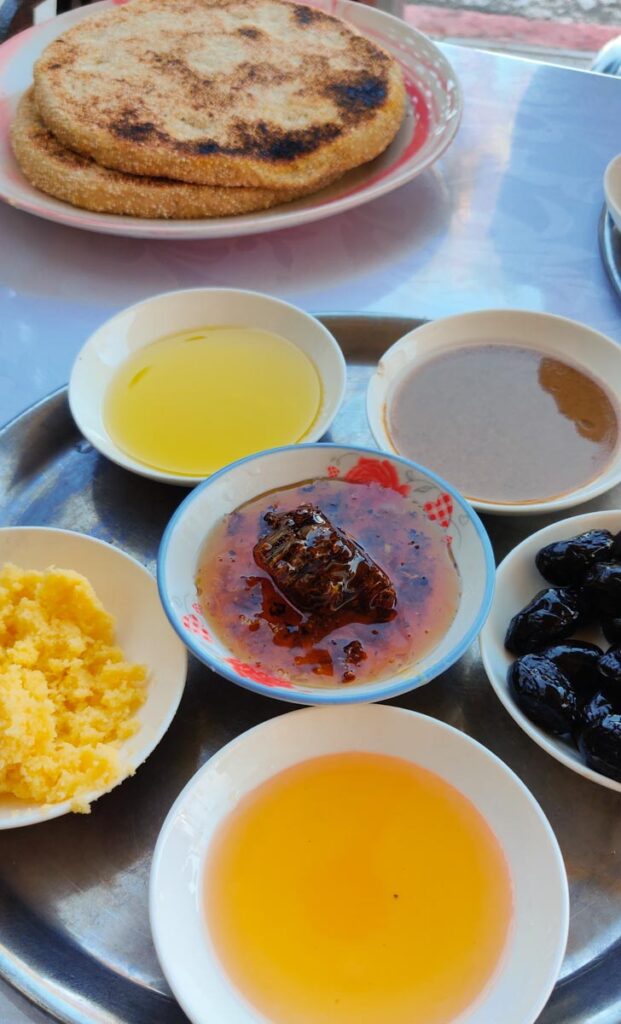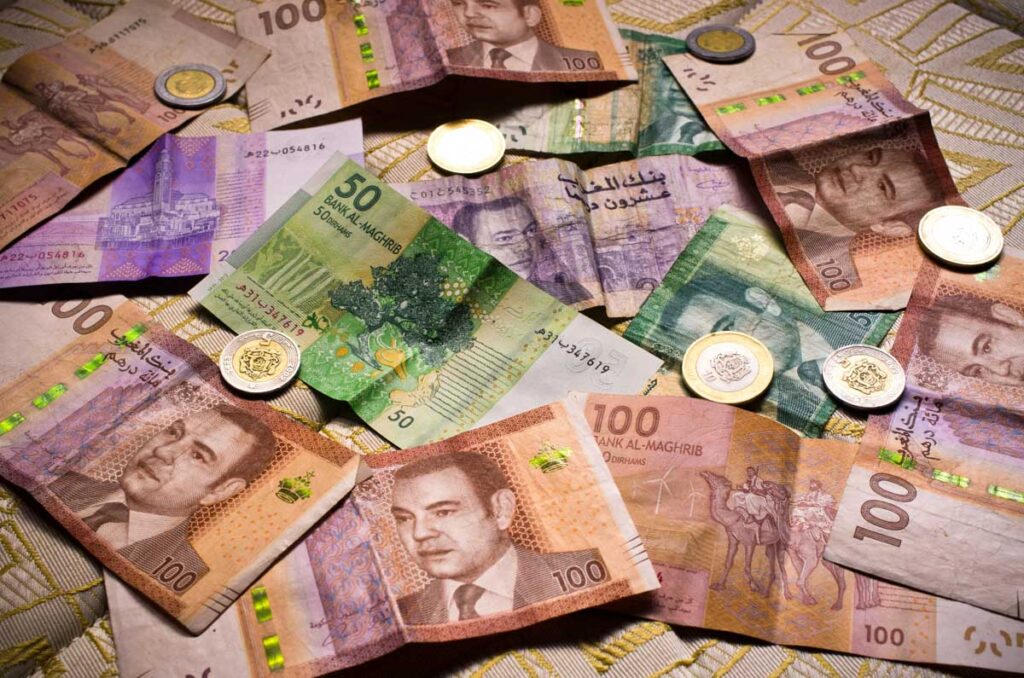Although living and travelling in Morocco is significantly cheaper than in Western Europe, it is not a classic budget travel destination. Of course, there are still a few ways to save money when travelling in Morocco. So that you can spend it on the more expensive adventures and experiences.
Eat where the locals eat
Morocco is known for its food, especially tajine and couscous, but there are many more traditional dishes. If you stay away from the tourist restaurants and the foreign restaurants in Marrakech and the other major cities, you can save a lot of money every day.
In Essaouira, for example, you can have breakfast for two for under €5, whereas in the hipster cafés you can easily pay €10 for a muesli bowl and 3,5€ for the coffee on top.
You can find my favourite restaurants in Essaouira here.
Tajines often only cost €4-6 in the small restaurants and are enough for two if you eat them with lots of bread, like the Moroccans do.
On the coast, you should always buy your own fish at the fish market and then have it grilled in a small restaurant. This often only costs as much for 2-3 people as a plate for one person in the fish restaurants.

Travelling by train, bus and taxi (bargain in taxis in Marrakech and Fez)
You can save a lot of money by travelling around Morocco by public transport instead of booking a driver. Trains and the Supratours and CTM buses are clean, punctual and relatively comfortable. The cheaper buses used by the locals are not air-conditioned and are often quite broken, at least as far as the seats are concerned.
There are also ‘big’ taxis between the cities, which are particularly useful for shorter journeys. And in every larger city there are of course ‘normal’ taxis, although these are often shared as well. Outside of Marrakech and Fes, either the taximeter is used or there is a fixed price per journey.
You can also find more information about public transport in this post.
Negotiate prices for souvenirs
When shopping in the souk, be sure to negotiate prices! And the bigger the city (especially Marrakech and Fes), the harder you should negotiate. In Marrakech and Fes, the last price should definitely be less than 50% of the first price, otherwise you will pay too much. In smaller towns such as Essaouira, for example, it is enough to negotiate about 30% down.
I also have a separate article with more information about souvenirs.

Spend the night in hostels or cheap riads
Prices for accommodation in Morocco vary greatly. You can almost always find something cheap, but sometimes with questionable cleanliness. So always read the reviews carefully.
In Fes and Marrakech, I highly recommend staying in a traditional riad. These are basically small boutique hotels with 4-10 rooms. The riads used to be the homes of wealthy families and are usually very elaborately decorated with mosaics and wood carvings.
They always have an open courtyard around which the kitchen, dining room and often a lounge are arranged on the ground floor. The bedrooms on the upper floors are also arranged around the inner courtyard. There are usually no windows to the outside, only to the courtyard, which is the typical construction method in Morocco. This makes it pleasantly quiet even in the rather noisy medina.
Hostels have been springing up in Morocco for a few years now and you can find one in every major city. Here, too, there are significant differences in terms of facilities and comfort. Often there are also private rooms if you are not the dormitory type. The advantage of hostels for solo travellers is that you automatically meet people with whom you can then share other costs, e.g. for transport, or eating out or cooking together.

Eat your breakfast on the go
Most hotels are cheaper if you book them without breakfast, often €5-10 less. And you’ll find plenty of little kiosks or stalls outside, in the medinas or simply on the street, offering simple sandwiches with cheese or eggs. Or even the delicious msemen (a kind of crepe made from puff pastry). That way, breakfast costs less than one euro. And you can often find a juice shop next door and drink a fresh orange juice or an avocado milkshake.
You prefer to let others do the planning? I offer itinerary planning for your trip to Morocco! You can check out the details here.
Get your money from an ATM
People often ask where they should change their money when they come to Morocco. In my experience, the cheapest way is to simply withdraw money from an ATM, especially if you have a card which doesn’t charge any fees.
As Moroccan banks generally only allow 2000 DH per withdrawal (although this can be several times in a row), fees can quickly pile up. The El Barid Bank, which can always be found directly at the Poste Maroc (even if google maps doesn’t always know this), doesn’t charge a fee and is therefore a good way to save money.
If you still prefer to exchange cash, the best place to do this is at a bank. They have to stick to the official exchange rate. You sometimes have to show your ID, but otherwise it’s very straightforward.

Is my blog helping you?
Maybe you want to thank me by inviting me for a coffee!
Hammam instead of spa
If you would like to try a traditional Moroccan hammam, you should stay away from the fancy spas in the big cities and can save a lot of money. The spa hammams in Marrakech and other cities often cost 350 DH or more for a basic treatment.
In the classic hammams, where the locals go, you can get the whole thing for much less. Just the bath itself, with a stool and bucket borrowed locally, can be had for as little as 15 DH. Hammam soap is sold for 1-2 DH. And to be scrubbed down properly by the staff costs around 60-80 DH.
However, you will rarely find anyone who speaks English in the local hammams, so you should have no problem communicating with your hands and feet.
Don’t drink alcohol
Alcohol can be found everywhere in Morocco if you know where to look. But it is expensive. And not always good. If you are looking for a party holiday with lots of alcohol, you should perhaps choose a different country. After all, Morocco is Muslim, and alcohol is officially forbidden for locals.
If you only like to have a glass with dinner, you will have no problem finding restaurants that serve alcohol. But a glass of wine can cost €6-10 and is nowhere near as good as you are used to at home.
Have any other tips to save money in Morocco? Let me know in the comments!
Please note that some of the links above are affiliate links and, at no additional cost to you, I earn a small commission if you make a purchase. That income goes to supporting this website and keeping it free for you and everyone else!


2 Comments
Great tips on saving money while exploring Morocco! Quick question: when buying fish at the market to have grilled, are there any specific spots or vendors you’d recommend to avoid hassle and ensure freshness? Thanks!
Hi Leandro,
I always buy with the same vendor in Essoauira, but since they don’t have fixed shops or places I cannot actually give you his info, I always walk around until I see him. But generally the fish market by the port is the best place as they load the fish directly from the boats to the stalls.